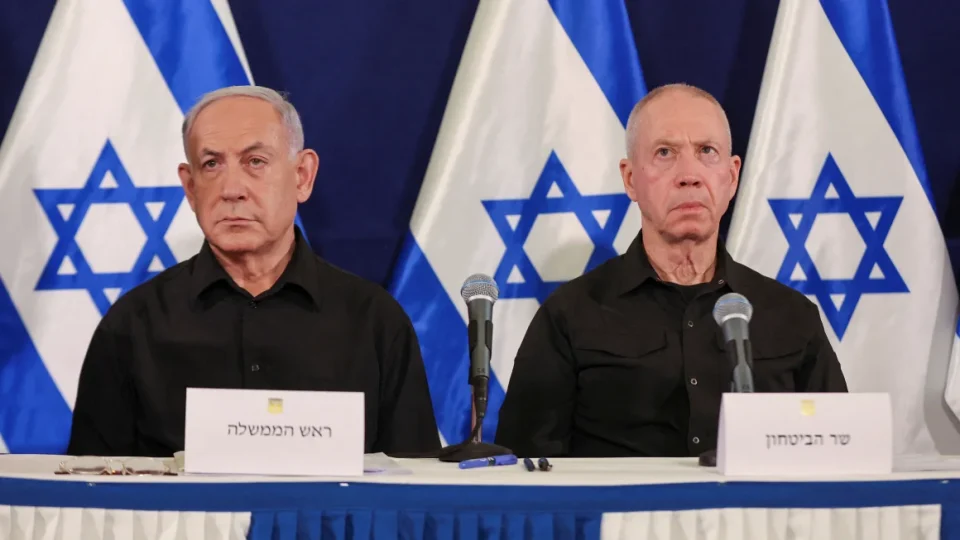A bitter dispute about the conditions for a hostage and ceasefire deal in Gaza erupted between Israeli Prime Minister Benjamin Netanyahu and Defense Minister Yoav Gallant at a meeting of the Israeli security cabinet on Thursday night, according to multiple reports in Israeli media.
The two men argued furiously over whether, as part of any deal, the Israeli military should leave the Philadelphi Corridor, a 14-kilometer (8.7-mile) that runs along the border between Gaza and Egypt, according to CNN affiliate Channel 12, the Times of Israel and other outlets.
The Philadelphi corridor is currently controlled by the IDF. The deployment of Israeli troops along the corridor during the first phase of a ceasefire agreement has been a major point of contention between Israel and Hamas, with Hamas saying Israeli troops must withdraw from the border zone.
According to multiple accounts, Netanyahu produced maps showing how the IDF should remain in the corridor during the first phase of the deal – in which hostages are also meant to be released – so as to prevent Hamas from resuming arms smuggling through tunnels under the corridor.
“I would like to bring the decision on the IDF troops remaining in the Philadelphi Corridor for the Cabinet’s approval,” Netanyahu is reported to have said.
Gallant interjected, according to the accounts of the meeting, saying: “The significance of this is that Hamas won’t agree to it, so there won’t be an agreement and there won’t be any hostages released.”
He also alleged that Netanyahu had drawn up different maps to those preferred by Israeli negotiators in Cairo, adding: “You imposed these maps on them.”
Netanyahu angrily rejected the claim, but Gallant persisted. “Of course you forced (it). You’re running the negotiations on your own. Since you disbanded the War Cabinet, we hear everything after the fact.”
Gallant appeared to receive support from the Chief of the General Staff Herzi Halevi, who was at the meeting. He is reported to have said that the IDF could withdraw from the corridor and return “at the end of six weeks of ceasefire. There are enough constraints for negotiations, there’s no need to add another one.”
According to published accounts, Gallant said at one point that “the prime minister can indeed make all the decisions, and he can also decide to kill all the hostages,” provoking rebukes from other ministers. He added that “30 lives are at stake.”
Gallant added that “in the end Sinwar will dictate to you and you’ll retract,” a reference to the Hamas leader Yahya Sinwar, who is thought to be in hiding in Gaza. Netanyahu in response reportedly insisted that no one dictated to him, saying that “only determined negotiation will make him (Sinwar) fold.”
The cabinet proceeded to vote on the maps that Netanyahu presented, approving them by eight to one, the only dissenter being Gallant. The right-wing National Security Minister Itamar Ben Gvir abstained from the vote. Israeli media cited sources close to him as saying he opposed any gradual decrease in the number of soldiers in the corridor.
An Israeli official told CNN on Saturday that they were unable to comment on the maps presented to the meeting but confirmed Netanyahu asked the cabinet to hold a vote on forces remaining in the Philadelphi corridor.
The Hostage and Missing Families Forum responded to the media reports of the meeting with a statement that they “should cause every Israeli citizen to lose sleep.”
West Bank incidents
Reports of the dispute between top Israeli officials emerged as violence continues to rock the Israeli-occupied West Bank.
Two security incidents happened overnight on Friday, in which two men were shot dead and a vehicle exploded, according to the IDF.
The IDF said that a vehicle caught fire and exploded late Friday at a gas station at the Gush Etzion intersection. “Forces that arrived at the point shot and killed the terrorist who got out of the vehicle and tried to attack them.”
The IDF said that nearby, “terrorists tried to run over a security guard at the entrance to the settlement of Karmei Tzur,” a settlement north of the city of Hebron. One of them was killed.
The IDF said there had been several casualties in the two incidents.
The Israeli emergency services (MDA) said that shortly before midnight it received a report of two gunshot victims near the gas station. The victims were moderately injured with gunshot wounds.
The MDA said that a vehicle apparently breached the entrance to the Karmei Tzur community. The head of security at the settlement received minor injuries when pursuing the vehicle, according to the IDF, and “during the confrontation, an explosive device in the terrorist’s car detonated.”
The Palestine Islamic Jihad movement said its fighters were responsible for the attacks and claimed without offering evidence that a number of Israeli soldiers had been killed.
The IDF said Saturday that security forces continue searches for additional suspects near Karmei Tzur community.
“The initial examination of the vehicle explosion at the Gush Etzion gas station indicated that the incident was an attempted car bombing by a terrorist,” it said.
Several soldiers had received light or moderate injuries, it said.



